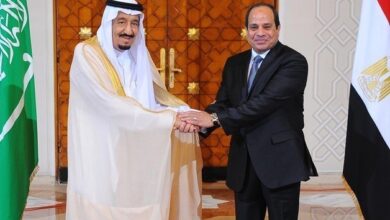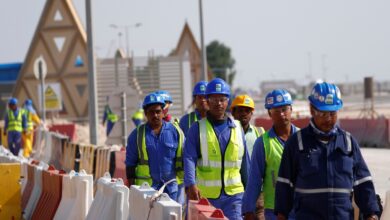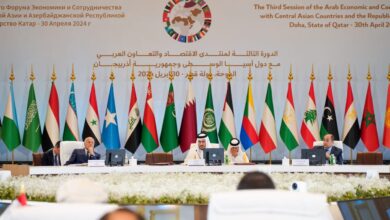
Ashraf AboArafe
Entitled by “New Horizons in the South of Caucasus – The End of the Karabakh Issue”, a press conference will be held by Ambassador Dr. Elkhan Polukhov about the latest events in the region.
* 44-day war.. Security & war!
Occasionally, let’s highlight the 44-day war that led to an achievement of security and peace in the Caucasus region. The Second Karabakh War of 2020, which Azerbaijan fought in the Karabakh region, was not a war over disputed lands, nor a war to occupy the lands of another country by military force, but rather it was a legitimate war according to the rules and customs of international law, to liberate occupied lands, with the testimony of all countries. And international organizations, especially the United Nations, which approved that Armenia has no right to attack the lands of Azerbaijan and occupy its lands by military force.
* Illegal!
The United Nations recognized that Armenia’s seizure of the territories adjacent to the “Mountain Karabakh” region is illegal, and that these territories are occupied Azerbaijani lands, and then the Council issued a International Security Resolution No. 822 of April 30, 1993, regarding the occupation of the “Kalbajar” region, Resolution No. 853 of July 29, 1993, regarding the occupation of the “Aghdam” region, and Resolution No. 874 of October 14, 1993 regarding the occupation of the “Fuzuli, Gabriel, and Qubadli” regions, As for the fourth resolution, which bears the number 884 of November 12, 1993, it was regarding the occupation of the “Zenjilan” region by Armenia.
* Withdrawal & immediately!
The UN Security Council recognized in its four resolutions that the “Mountain Karabakh” region occupied by Armenia is an integral part of the territory of Azerbaijan, and demanded The necessity of respecting the sovereignty and territorial integrity of Azerbaijan and the borders recognized by the international community, and the United Nations resolutions demanded the withdrawal of all Armenian forces from the occupied territories of Azerbaijan immediately, completely and unconditionally, and providing the opportunity for the displaced to return to their homes and the land from which they were displaced in safety and security.
* No longer!
Before the 44-Day War and previous wars, Armenia realized that the principle of the people’s right to self-determination, which they were defending, was no longer able to provide ideological and theoretical support for the occupation of Azerbaijani lands. First, because the concept of “the people of Nagorno-Karabakh”, if we assume its legitimacy, presupposes the two communities that existed before the outbreak of the conflict in 1988…. Therefore, it included not only the Armenians living in this Azerbaijani region, but also the Azerbaijanis who were actually expelled from there during the conflict as a result of ethnic cleansing carried out by the Armenian side. Secondly, the idea of “Nagorno-Karabakh people”, which the Armenian side tried to impose on the international community, Giving it a certain ethnic characteristic, it did not withstand criticism for the reason that the Armenians as a people. They have already decided their fate within the framework of the Republic of Armenia. In other words, the “people of Nagorno-Karabakh” in its Armenian interpretation simply does not exist.
Thirdly and finally, even if the international community agrees with the Armenian interpretation of this concept, this does not guarantee the occupiers the possibility of international recognition of the consequences of the occupation. Because the principle of the right of the people to self-determination, which Armenia defends, in accordance with international law, including the provisions of the Helsinki Final Act, It does not conflict with another basic principle (the territorial integrity of states), which means, on the one hand, that the right to self-determination can be guaranteed within the framework of the territorial integrity of the state, and on the other hand, the priority of the principle of territorial integrity rejects the possibility of secession from the state. From any part of it, even under the pretext of the right to self-determination.
* Without any restrictions!
These international legal assumptions have created serious problems for Armenian diplomacy focused on bringing legitimacy to the consequences of the occupation of Azerbaijani territories. Therefore, in the last few years before the start of the 44-day war, it began to insist not only on “the people’s right to self-determination,” but indeed “on The right of the people to self-determination without any restrictions.” The understanding of this term, of course, is to separate part of its internationally recognized territory from Azerbaijan. However, this did not have the expected effect on the Armenian side, because this concept, which fundamentally contradicts the principle of territorial integrity, simply does not exist in international law.
* Collapse!
With the start of the 44-day war, when the inevitability of the country’s defeat and the collapse of the occupation policy became clear to the leadership of Armenia, it launched a new idea that is trying to break through at the international level today. To justify its continued claims to Azerbaijan’s lands.
This is the so-called “separation for salvation” concept. Its essence boils down to the possibility of forced separation from the state of any part of it by the international community, if the population living in this area cannot live under the rule of this state due to the discriminatory policy it pursues for the sake of racism and nationalism.
* A manipulative idea!
The so-called principle (separation for salvation) is nothing more than a manipulative idea invented by advocates of radical separatism and the aggressive strategy of a number of countries that raise the issue of redrawing borders between countries. The ugliest manifestation of this type of strategy is Armenia’s policy towards Azerbaijan. The defeated country is hiding behind the aforementioned “principle” at the present time, which is characterized in particular by the disastrous state of Armenia after the devastating defeat inflicted on it by Azerbaijan, and only confirms its existential unwillingness to break out of the circle of its hatred and hostility towards its neighbors. Therefore, its calculations regarding the application of this concept are useless from the point of view of international law and the possibility of overcoming the serious systemic crisis that Armenia is experiencing.
* A peaceful coexistence!
As for the “discrimination” that allegedly threatens Armenians living in the mountainous part of the Karabakh region of Azerbaijan, this is nothing more than a myth that Armenia has used since the beginning of the conflict to justify its predatory views on Azerbaijani lands. The Azerbaijani state has always supported peaceful coexistence between Azerbaijanis and Armenians in the mountainous part of Karabakh. After nearly 30 years of negotiations, Azerbaijan agreed to grant the Nagorno-Karabakh region the highest degree of autonomy. Now, as the victor of the Karabakh War, which was marked by the expulsion of Armenian occupation forces from its lands, Azerbaijan continues to proceed from taking into account the interests of the Armenian minority.




